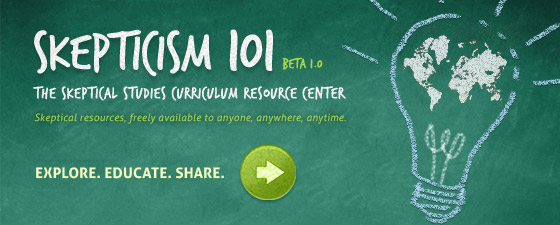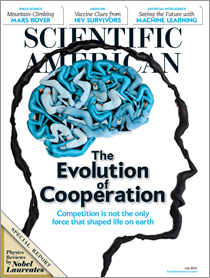Report from the Front Lines at TAM and Freedom Fest
By “rich” I mean intellectually, of course, because as all skeptics know, the laws of probability are precisely employed by all Las Vegas casinos to insure that if you play long enough the money in your pocket will end up in their coffers. It is not for nothing that it is called Lost Wages.
Actually, there are two ways to win at gambling. You can do it the way I did after the final session at TAM Sunday: play for a brief period of time and quit when you are ahead. I started with $200 at a $5 minimum Blackjack table. For around 20 minutes I bounced around between $150 and $250 in chips artfully stacked in front of me as I pretended to be a big spender. The inevitable losing streak then kicked in and I was suddenly down below $50, then clawed my way back up to $228 when it was time to go, saving myself from the over-confidence bias that would have, in time, left me with nothing but green cloth beneath my empty palms. (The other way to win at gambling in Las Vegas? Be the owner of a casino.) (continue reading…)
Comments Off on Leaving Las Vegas … Rich
Or: What it was Like Teaching a Course in Skepticism 101?

On March 31, 2011, I debated Deepak Chopra at Chapman University on “The Nature of Reality” that also featured Stuart Hameroff, Leonard Mlodinow, and several other commentators, all choreographed by the Chancellor of Chapman University, mathematician Daniele Struppa. In the greenroom before the debate Dr. Struppa was reviewing my bio and noted that I am an adjunct professor at Claremont Graduate University and made a comment that I should be an adjunct professor at Chapman as well. I said something like “sure, why not?” and when he introduced me on stage he said something about how I might also one day teach there. Daniele said I could teach anything I want as part of their Freshman Foundations Courses, so I suggested a course on Skepticism 101, or how to think like a scientist (without being a geek). I taught it the Fall semester of 2011 to 35 incoming Freshman students and it was a blast. (continue reading…)
Comments Off on How to Learn to Think Like a Scientist (Without Being a Geek)
The death of the brain means subjective experiences
are neurochemistry

“WHERE IS THE EXPERIENCE OF RED IN YOUR BRAIN?” The question was put to me by Deepak Chopra at his Sages and Scientists Symposium in Carlsbad, Calif., on March 3. A posse of presenters argued that the lack of a complete theory by neuroscientists regarding how neural activity translates into conscious experiences (such as “redness”) means that a physicalist approach is inadequate or wrong. “The idea that subjective experience is a result of electrochemical activity remains a hypothesis,” Chop ra elaborated in an e-mail. “It is as much of a speculation as the idea that consciousness is fundamental and that it causes brain activity and creates the properties and objects of the material world.” “Where is Aunt Millie’s mind when her brain dies of Alzheimer’s?” I countered to Chopra. “Aunt Millie was an impermanent pattern of behavior of the universe and returned to the potential she emerged from,” Chopra rejoined. “In the philosophic framework of Eastern traditions, ego identity is an illusion and the goal of enlightenment is to transcend to a more universal non local, nonmaterial identity.” (continue reading…)
read or write comments (14)
Steve Jobs’s modus operandi of ignoring reality
is a double-edge sword
Robert Friedland was a long-haired, sandal-wearing, spiritual-seeking proprietor of an apple farm commune and student at Reed College when he met Steve Jobs in 1972 and taught the future Apple computer founder a principle called the “reality distortion field” (RDF). Macintosh software designer Bud Tribble recalled, “In his presence, reality is malleable. He can convince anyone of practically anything.” And yet the blade could cut two ways: “It was dangerous to get caught in Steve’s distortion field, but it was what led him to actually be able to change reality.” Another Mac software designer named Andy Hertzfeld said, “The reality distortion field was a confounding mélange of a charismatic rhetorical style, indomitable will, and eagerness to bend any fact to fit the purpose at hand.” The first Mac team manager Debi Coleman said Jobs “reminded me of Rasputin. He laser-beamed in on you and didn’t blink. It didn’t matter if he was serving purple Kool-Aid. You drank it.” And yet when the power was properly channeled, “You did the impossible, because you didn’t realize it was impossible.”
The RDF is an extreme version of what the psychologist Daniel Kahneman calls a “pervasive optimistic bias” in his 2011 book Thinking, Fast and Slow (Farrar, Straus and Giroux). “Most of us view the world as more benign than it really is, our own attributes as more favorable than they truly are, and the goals we adopt as more achievable than they are likely to be.” For example, only 35 percent of small businesses survive in the U.S., but when surveyed 81 percent of entrepreneurs assessed their odds of success at 70 percent, and 33 percent went so far as to put it at 100 percent! “One of the benefits of an optimistic temperament is that it encourages persistence in the face of obstacles,” Kahneman notes, while also citing study in which 47 percent of inventors “continued development efforts even after being told that their project was hopeless, and on average these persistent (or obstinate) individuals doubled their initial losses before giving up.” Failure may not be an option in the minds of entrepreneurs, but it is all too frequent in reality, which is why another bias called “loss aversion” is felt by most. Thus, Jobs’s success story is also an example of a selection bias whereby those who failed tend not to have biographies. (continue reading…)
Comments Off on The Reality Distortion Field
For the forth time in my life I journeyed north on Pacific Coast Highway along the ragged California coast line north of San Simeon and the Hearst Castle where the road turns twisty and the cliffs bend vertical. The Esalen Institute is nestled on the ocean side of the highway atop some bluffs dotted with buildings that include yoga rooms, Yurts, Spartan housing overlooking the ocean, a soup kitchen-like cafeteria serving spectacularly healthy food (lots of Tofu and veggies, no tri-tips or ribs), and workshops catering to just about every belief ever investigated and found wanting in the pages of Skeptic magazine.
Nevertheless, I loved my time there once again, not only for the breathtaking scenery and unprecedented views, or the invigorating cycling and hiking, or the natural hot springs pouring out of the mountain and into elegantly designed hot tubs (clothing optional, and most opt to go without), but for the apparent incongruity made congruous when we consider our mission as skeptics to take our message of science and critical thinking to those who need to hear it most.
My workshop was entitled “Science, Spirituality, and the Search for Morality and Meaning.” First, I must say that the 24 participants in my workshop were already as skeptical as one might find at one of our Sunday Caltech lecture series meetings and dinners. All were well-read in the sciences and humanities to the point that I learned as much as I taught, and the ensuing conversations both during and after the lectures, along with at the meals, were exceptional. (continue reading…)
Comments Off on A Weekend of Woo (Or why I love the Esalen Institute)



